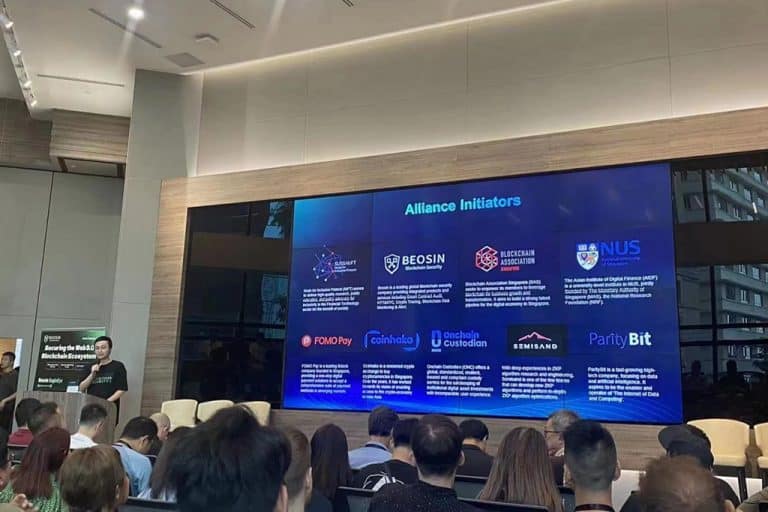Place/Date: – September 29th, 2022 at 2:21 pm UTC · 4 min read
Source: Beosin
On September 24, Beosin, a leading global Web3.0 blockchain security company, launched the “Blockchain Security Alliance” in partnership with the Singapore University of Social Sciences (SUSS) Node for Inclusive FinTech (NiFT), the National University of Singapore (NUS) Asian Institute of Digital Finance (AIDF), Singapore Blockchain Association, FOMO Pay, Coinhako, Onchain Custodian, Paritybit, and Semisand.
The Alliance members will cooperate closely in blockchain ecology, integrating technological innovation in the field of blockchain security, exploring and establishing a sound blockchain security ecosystem. The Alliance aims to foster collaborations between the industry, academia, and researchers in blockchain security, apply scientific and technological innovations, and create a sustainable environment for Web3 blockchain ecosystem development. With the interests of Singapore at its core, the Alliance wish to raise cybersecurity awareness among Singapore blockchain startups and enterprises and to help integrate the Chinese Web3 community into the local business culture.
With the rapid development of the Web3 ecosystem, cybersecurity issues should not be overlooked, which is also the core reason for establishing the Blockchain Security Alliance. Last Saturday, Professor Monica Yang, the founder of Beosin, Global FinTech Institute (GFI) Chairman & SUSS Professor David Lee Kuo Chuen, Da Hong Fei, the founder of Neo, Yang Zhan, the co-founder of FOMO Pay, and Patrick Dai, the founder of Qtum, had a panel discussion on the topic “How to build a secure Web3 ecosystem in Singapore”. It was an informative and insightful exchange with more than one hundred on-site audiences.
According to Professor Monica Yang, “The Web3 atmosphere in Singapore is very vibrant with a handful of top blockchain companies setting up their offices here in Singapore. Beosin has also formed a local elite team to serve Beosin overseas customers from Singapore. Undeniably, there is a lack of tech talent in Singapore and this prompted us to work closely with universities in Singapore and China. Together with the industry experts, the team will provide training and overcome the manpower crunch. This is also one of the main reasons why Professor David Lee and I, along with the rest of the Alliance members, are so determined to launch the Blockchain Security Alliance.
David Lee Kuo Chuen, Professor at the Singapore University of Social Sciences (SUSS), commented on the current state of Web3 security industry and the vital role that security companies play in developing the blockchain ecosystem. He further highlighted the inclusiveness of Singapore’s policy and how it has continued to attract global talents. At every stage of development, Singapore embraced and adopted each industry’s most advanced technology. Therefore, the establishment of security companies will have a significant impact on the blockchain ecosystem. Web3 has no boundaries, and together with partners like Beosin, we wish to strengthen the Web3 security ecosystem.
Meanwhile, Mr. Da Hongfei has shared his insights on the industry’s development over the last two years. On hacking and its impact on the blockchain ecosystem, Mr Yang Zhan brought up security-related issues in digital payment. At the same time, Mr Patrick Dai shared his view on the development and innovation of blockchain technology and how important it is for cybersecurity to be in place. During the panel discussion, the panellists shared their vision for Web3 and how they can contribute to the development of the Web3 ecosystem.
Establishing the Blockchain Security Alliance will lead to a community committed to defending the blockchain ecosystem’s security. The community will consist of tertiary education institutions, researchers and security industry experts. The Alliance members will work on guidelines and codes of conduct for the blockchain security industry, conduct research and development, roll out blockchain ecosystem security alerts, generate monthly and annual security reports, and ensure the development of a healthy blockchain ecosystem. The Alliance will also conduct information security information-sharing sessions and public welfare training, train talents in blockchain security, and organise annual global blockchain conferences to discuss and disseminate blockchain technology’s latest trends and challenges.
Towards the end, Professor Monica Yang underpinned the vision the Blockchain Security Alliance. She said:
“With the establishment of the Alliance, we are not only looking at making tangible contributions to the blockchain security ecosystem for the development of the industry. The establishment of the Alliance also reminds us to remember our mission – to focus on the research and development of blockchain security and provide a one-stop solution for blockchain enterprises and regulators. The services include auditing code security, system security monitoring and alerts, compliance security audit and anti-money laundering. At the same time, we will work with the universities and the Alliance members to promote fundamental blockchain security knowledge, cultivate blockchain security talents and defend the development of the blockchain security ecosystem.”
If you would like to join the “Blockchain Security Alliance”, please feel free to contact us.
Beosin socials: Twitter, Twitter Alert, Telegram.
Disclaimer: Coinspeaker is not responsible for the trustworthiness, quality, accuracy of any materials on this page. We recommend you conduct research on your own before taking any decisions related to the products/companies presented in this article. Coinspeaker is not liable for any loss that can be caused due to your use of any services or goods presented in the press release.
Subscribe to our telegram channel. Join


